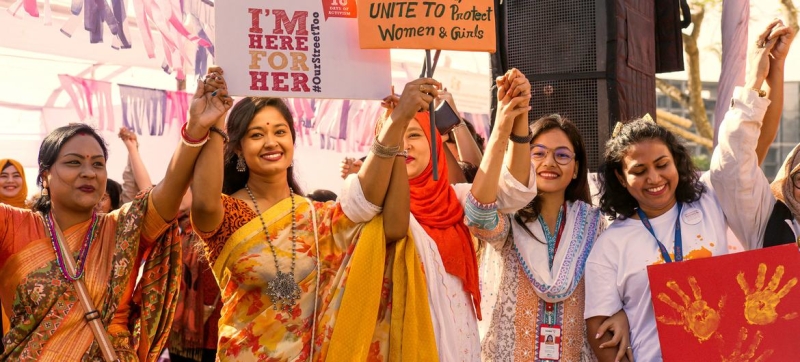
An event as part of the 16 Days of Activism Against Gender-Based Violence campaign in Bangladesh. Every 10 minutes, a woman is killed by an intimate partner or family member Women
Every day, 140 women and girls are killed by their partner or close relative worldwide, or on average, one woman dies every 10 minutes as a result of domestic violence. These are the findings of a report published by UN Women and the UN Office on Drugs and Crime (UNODC) on the International Day for the Elimination of Violence against Women, which is marked on November 25.
Violence against women remains widespread, including in its most extreme forms, the UN warns. This is called “femicide” – the deliberate killing of women and girls with gender motivation.
A Shame on Humanity
The report’s data shows that 85,000 women and girls will be victims of intentional homicide worldwide in 2023. Of these crimes, 60 percent – 51,000 – were committed by intimate partners or other family members.
“The epidemic of violence against women and girls is a disgrace to humanity,” UN Secretary-General António Guterres said in his message on the occasion of the International Day.
According to him, approximately one in three women worldwide faces physical or sexual violence, and the situation is only getting worse.
“It has been almost 30 years since the Beijing Declaration and Platform for Action promised to prevent and eliminate violence against women and girls, – it is long overdue to deliver on that promise,” he added. he.
Domestic Murders
Although men and boys make up the vast majority of victims of all homicides, women and girls continue to suffer disproportionately from violence in their homes. An estimated 80 percent of people killed in 2023 were men, but domestic violence is far more dangerous for women. Almost 60 percent of all women who were intentionally killed in 2023 were killed by an intimate partner or family member.
In 2023, the highest rates of domestic femicide were recorded in Africa, followed by the Americas and Oceania.
Read also:
The Saltanat Case and the Criminalization of Domestic Violence in Kazakhstan: Human Rights Activists Call for Tougher Laws
Data from countries in Europe and the Americas show different levels and trends of femicide within these regions. For example, although the rate has decreased significantly between 2015 and 2021, the prevalence of such homicides in Eastern Europe is still approximately twice as high as in other parts of the continent.
In Europe and the Americas, the majority of homicides of women in the home (64 percent and 58 percent of incidents, respectively) were committed by intimate partners, while in other countries other family members were more often the main perpetrators.
Prevent Femicides
“Violence against women and girls is preventable, and we know how it works. We need robust legislation, better data collection, greater government accountability, a culture of zero tolerance and more funding for women’s rights organisations and institutions,” said UN Women Director-General Sima Bacchus.
Available data confirm that a significant proportion of women killed by their intimate partners (between 22 and 37 per cent) had previously reported some form of physical, sexual or psychological violence by their partner. This suggests that many killings could have been prevented. Orders against male partners that prohibit further contact between them and victims of violence are one possible protective measure.
“The new report on femicide highlights the urgent need to build strong criminal justice systems that hold perpetrators accountable while ensuring adequate support for survivors, including access to safe and transparent reporting mechanisms,” said Ghada Waly, Executive Director of UNODC. “At the same time, we must challenge gender biases, power imbalances and harmful norms that perpetuate violence against women.”
This year marks the 25th International Day for the Elimination of Violence against Women. As part of the 16 Days of Activism campaign, which begins today, UN Women will call on the international community to implement its commitments to protect women.
